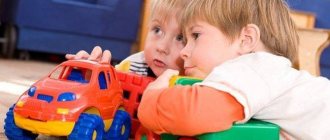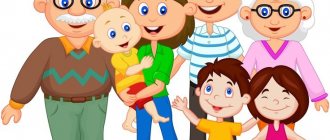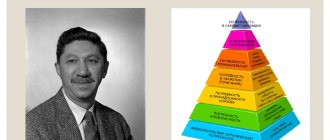“My child doesn’t want to socialize”, “Her boy doesn’t go to kindergarten, he will have problems with socialization” - isn’t it true, you often come across these and similar phrases on forums, and hear them on playgrounds.
They are based on fears and experiences related to the fact that the child will not be able to successfully undergo the process of adaptation in society, will not learn to communicate, will be isolated, expelled from all social groups.
To get rid of fears or, conversely, realize how difficult the situation is, read what socialization is, what it is like and why it is impossible to talk about it as a one-sided process.
In this article:
What is socializationTypes of socializationSocialization as a two-way process
Socialization concept
The concept of socialization is synonymous with the concept of “personality development” in developmental psychology. However, their key difference is that the first involves a view from the side of society, and the second - from the side of the individual himself.
Also, the concept of socialization is synonymous with the concept of “upbringing” in educational psychology, but not in its narrow sense, but in its broad sense, when it is assumed that the whole life, the whole system educates.
Socialization is a complex multi-level process of an individual’s assimilation of social reality. On the one hand, this is a process that helps a person to assimilate everything that surrounds him in social reality, including social norms and rules of society, elements of culture, spiritual values developed by humanity, and therefore helps him subsequently act successfully in this world.
On the other hand, this is also a process that is associated with how exactly this learned experience is further applied by the individual, that is, how the individual, being an active social subject, implements this experience.
The most important factors in the socialization of an individual are the phenomenon of a person being in a group and self-realization through it, as well as his entry into increasingly complex structures of society.
Socialization of personality in the modern world.
Elena Esina
Socialization of personality in the modern world.
Introduction
The lives of people in our country have changed radically. These changes have affected almost all aspects of our lives, transforming them radically at all levels: from the individual living conditions of a particular person to the social foundations of society . In modern sociocultural conditions, it is necessary to treat the individual as an open, changing system. the socialization of the individual takes on special importance , during which he tries to adapt to social pressure and establish a balance between internal and external values.
One of the fundamental problems of the sciences involved in the study of personality is the study of the process of socialization , that is, the study of a wide range of issues related to how and thanks to what a person becomes an active social subject. In conditions of increasing complexity of social life, the problem of including a person in social integrity , in the social structure of society . The main concept that describes this kind of inclusion is “ socialization ”
allowing a person to become a member of society.
By choosing this topic, I strive to discover for myself an understanding of the individual in society . In the modern world, in order to find a specific answer to a question, you often have to answer many other questions. It’s the same in my topic: first you need to ask yourself the question, what is socialization and personality .
Socialization
It is well known that the process of socialization plays a decisive role in
personality formation . Socialization is the process of an individual’s assimilation of patterns of behavior, psychological attitudes, social norms and values , knowledge, and skills that allow him to function successfully in society. Unlike other living beings, whose behavior is determined biologically, man, as a biosocial , needs the process of socialization in order to survive. According to N.D. Nikandrov and S.N. Gavrov, “ socialization involves multilateral and often multidirectional influences of life, as a result of which a person learns the “rules of the game” accepted in a given society, socially approved norms , values, and patterns of behavior.” Initially, the socialization of an individual occurs in the family, and only then in society.
Socialization is divided into primary and secondary. Primary socialization is very important for a child, as it is the basis for the rest of the socialization . The family plays the greatest role in primary , from where the child draws ideas about society, its values and norms. So, for example, if parents express an opinion that is discriminatory regarding any social group , then the child may perceive such an attitude as acceptable, normal, and well-established in society. Secondary socialization occurs outside the home. Its basis is the school, where children have to act in accordance with new rules and in a new environment. In the process of secondary socialization, the individual no longer joins a small group, but a medium one. Of course, the changes that occur in the process of secondary socialization are less than those that occur in the process of primary.
socialization process consists of several stages:
a) Adaptation stage (birth - adolescence)
.
of social experience occurs ; the main mechanism of socialization is imitation .
b) The emergence of a desire to distinguish oneself from others - the identification stage.
c) The stage of integration, introduction into the life of society, which can be either successful or unsuccessful.
d) Labor stage. social experience is reproduced and the environment is affected.
Post-working stage (old age)
.
This stage is characterized by the transfer of social experience to new generations. In general, socialization is a complex , vital process. It largely depends on him how an individual will be able to realize his inclinations, abilities, and develop as a person .
After thinking about it, I noticed that socialization is also the process of acquiring basic skills for living in a social environment . The social environment for me is my family and the people around me - friends, colleagues and others.
Personality
Personality is those characteristics of a person that are responsible for the consistent manifestations of his feelings, thinking and behavior. The personality of each person is endowed only with its own inherent combination of traits and characteristics that form its individuality - a combination of psychological characteristics of a person that make up his originality, his difference from other people. There are many definitions of personality, for example :
1) Kovalev A.G. defined the concept of personality as a complex , multifaceted phenomenon of social life, a link in the system of social relations. 2) Asmolov A.G. considered personality from the point of view of the problem of the relationship between the biological and the social in a person .
The formation of a person as an individual occurs only in specific social conditions. The demands of society determine both the behavior patterns of people and the criteria for assessing their behavior. The individual is inseparable from society. Society shapes the individual in the interests of preserving and developing society. The individual is the creator of social wealth.
What at first glance seems to be the natural qualities of a person (for example, his character traits) is in fact the consolidation in the individual of social requirements for his behavior.
Socialized individuals are those adapted to the conditions of their social existence , desocialized individuals are deviant , deviating from basic social requirements and mentally abnormal individuals .
Along with social adaptability, a developed personality has personal autonomy , assertion of his individuality. In critical situations, such a person retains his life strategy, remains committed to his positions and value orientations ( personal )
.
She prevents possible mental breakdowns in extreme situations with a system of psychological defenses (rationalization, repression, revaluation of values, etc.)
.
To understand a personality means to understand what life tasks and in what way it solves, what initial principles for solving these problems it is armed with.
Having thought about this topic, what personality is, I came to the conclusion that it is inherent in every person. Everyone in society acts as an individual, everyone has their own role , and everyone has their own actions in certain circumstances. I think the concept of " personality "
can be considered as: a set of habits and preferences.
I can also say that one is not born a person, one becomes a person .
Modern world
In the modern world, socialization occurs within the framework of certain institutions that carry out the function of transmitting social experience and attitudes accumulated by previous generations. In addition, the function is to maintain interaction between individuals in order to facilitate the transfer of individual experiences and value orientations. All this should contribute to both the personal development of the individual and his formation as a member of a particular society. Many do not pay attention to the spiritual preconditions of work, its valuable foundations and significance as a factor of socialization . But we consider labor activity as a category of the economy; it seems to us to be very superficial and one-sided.
Any social impact that arises in the process of work activity should contribute to the moral renewal of the individuals involved in it, their assimilation of certain ethical guidelines of society, which to a certain extent represents the ultimate goal of socialization . Thus, the development of personality , its involvement in the system of social values and norms . Such adaptation means the assimilation of the most important aspects of social life, and therefore gradual socialization .
In the modern world, socialization is characterized by the humanization of childhood, when the child acts as the main value of the family and society.
In order to become a full member of society, a person needs more and more time. If earlier socialization covered only the period of childhood, then modern man needs to socialize throughout his life . Also in the modern world, the socialization of personality is characterized by an intense change in determinants. Social uncertainty not only causes changes in the inclusion of individuals in communities , but also becomes a norm regulating the behavior of the subject. In this regard, the research of psychologists and related specialists is increasingly focused on the study of the value-semantic basis of risky behavior and the
individual’s (readiness) for innovative behavior.
The modern world is full of different computer technologies and often, in connection with this, the individual (person)
hides from society, from live communication on the Internet.
, socialization of the individual cannot occur . And also, the socialization of the individual in the modern world is largely a contradictory, often uncontrollable process. Such inconsistency and spontaneity in the formation of basic social values and behavior patterns can lead to devastating consequences for both the individual and society as a whole.
Conclusion
The result of this topic is that at all stages of the development of society, processes occur in it that determine both the very essence of the social reality , and the features of the development of the individuals .
The process of socialization reaches a certain degree of completion when the individual reaches social maturity , which is characterized by the individual acquiring an integral social status . However, in the process of socialization, failures and failures are possible. socialization deficiencies is deviant
behavior.
As a result, the socialization of an individual in the modern world directly depends on the achievements of society.
At this stage, society is subject to intensive development of digital technologies, which affect the adaptation and socialization of the individual in society . I gave examples and arguments for the socialization of the individual in modern society, and in my opinion, spirituality in it has been relegated to the background, making the economic direction of development a priority.
I believe that in order to solve the problems of socialization, every person must understand that gadgets cannot replace the “living”
communication.
We need to spend more time with family and friends, communicate, share, and not be closed off. It is also useful to read books and know what is happening in the region, in the country and in the world . After all, this is self-development.
Goals and objectives
The goal of socialization is the formation of a responsible and socially active generation, whose actions are regulated by social norms and public interests. It solves three main problems:
- integrates the individual into society;
- promotes the interaction of people through their assimilation of social roles;
- preserves society through the production and transmission of culture from generation to generation.
Socialization is the result of a person’s mastery and active use of traditional sociocultural heritage while maintaining and developing their individuality.
Socialization factors
The socialization of an individual is carried out under the influence of genetic, individual, personal and social factors.
Microfactors
They take into account the influence of unregulated communities, educational institutions, religious organizations, labor collectives, families and small groups.
Requirements for an individual vary depending on the history of the development of social structures:
- features of property redistribution;
- dominant religious orientation;
- characteristics of labor relations;
- principles of organizing teams;
- state of education.
In conditions of stable progressive development or social crisis, adaptation processes are different. In the latter case, people are alienated from each other, are in a state of lawlessness and a deformed value system.
Macro factors
Social personality is formed under the influence of state institutions. Large social communities create psychological, socio-economic, political, cultural and spiritual differences.
State ideology is important, which:
- Forms the identification of the individual, his social status, development prospects, opportunities for implementation, rights and responsibilities.
- Reinforces a system of values and patterns of encouraged social behavior.
- Creates the media, political parties and public organizations, a system of training and education of the younger generation.
Mesofactors
These include influences on the individual from medium-sized communities. The following leave their mark on the formation of a person’s worldview and behavior:
- A person's nationality. People of the same ethnic group are united by: language, traditions, cultural characteristics, common behavioral stereotypes.
- State religion. Values and shrines enshrined in religious rituals and literature are often distinctive features of a person belonging to a particular faith.
- Specificity of the region. Social, cultural, and historical originality is characteristic of many regions of Russia. For example, Cossacks and Siberians have their own patterns of behavior, traditions, moral standards and spiritual values.
Mechanisms
Every society has socialization mechanisms through which people convey information about social reality to each other. In sociological terms, there are some “translators” of social experience. These are means that transmit accumulated experience from generation to generation, contributing to the fact that each new generation begins to socialize. Such translators include various sign systems, cultural elements, educational systems, and social roles. Socialization mechanisms are divided into two categories: socio-psychological and socio-pedagogical.
Socio-psychological mechanisms:
- Imprinting is the imprinting of information on the receptor and subconscious levels. More common in infancy.
- Existential pressure - the assimilation of language and norms of behavior at an unconscious level.
- Imitation is following a model, voluntary or involuntary.
- Reflection is an internal dialogue during which a person critically thinks about and then accepts or rejects certain social values.
Social and pedagogical mechanisms:
- Traditional - a person’s assimilation of prevailing stereotypes, which occurs, as a rule, at an unconscious level.
- Institutional - triggered by a person’s interaction with various institutions and organizations.
- Stylized - functions when included in any subcultures.
- Interpersonal - turns on whenever there is contact with persons who are subjectively significant to a person.
Stages
Socialization is a step-by-step process. At each stage, the above-mentioned translators work differently, and special mechanisms are also included that contribute to better mastery of social reality.
In domestic literature, in particular, in textbooks on social psychology by G. M. Andreeva, three stages of socialization are distinguished: pre-labor, labor and post-labor. At each stage, the emphasis changes, and above all, the relationship between the two sides of socialization - in the sense of mastering experience and in the sense of transferring experience.
The pre-labor stage of socialization corresponds to the period of a person’s life from birth to the start of work. It is further divided into two independent periods:
- Early socialization is inherent in the period of time from birth to entry into school. In developmental psychology, this is the period of early childhood. This stage is characterized by uncritical assimilation of experience and imitation of adults.
- The learning stage covers the entire period of adolescence in a broad sense. It definitely includes time spent at school. But the question of which stage to include the student years has become the subject of debate. After all, many university and technical school students are already starting to work.
The labor stage of socialization corresponds to the period of human maturity, although it should be noted that the demographic boundaries of adulthood are very conditional. It covers the entire period of a person’s active labor activity.
The post-work stage of socialization implies the period of a person’s life after the end of the main work activity. It corresponds to retirement age.
Stages of socialization
Stages of socialization can be distinguished depending on age:
- The childhood period is the time of formation of the human “I”. Errors and violations at this stage often have irreversible consequences for the individual. According to science, 70% of skills, knowledge, behavioral stereotypes, and character traits are developed at this time.
- Teenage years. It is characterized by a physiological restructuring of the body, entailing strong psychological changes. Young people pay more attention to their appearance and place among their peers, and are faced with choosing a profession.
- The adult stage is the time of human self-realization. Connections with the chosen social group are strengthened, interpersonal communication becomes closer, a spouse is chosen, and the accumulated life experience is passed on to the children.
- The period of life after 50 years and old age is characterized by acceptance of one’s life, full awareness of one’s “I”. There is a gradual decline in physical and mental activity.
Kinds
To understand the types of socialization, it is necessary to consider the social institutions corresponding to each stage of development. At the pre-labor stage, institutions facilitate the individual’s entry into the social world and his mastery of this world, its features and laws. During early childhood, the very first institution within which a person begins to master social experience is the family. This is followed by various children's institutions.
During the period of education, the individual begins to interact with the first more or less official representative of society - the school. It is here that he first becomes acquainted with the basics of socialization. Institutions corresponding to this period provide the necessary knowledge about the world around us. Also during this period, the peer group plays a huge role.
Labor stage institutions are enterprises and work collectives. As for the post-labor stage, the question remains open.
Based on the institutional context, two types of socialization are distinguished: primary, associated with the acquisition of experience from a person’s immediate environment, and secondary, associated with the formal environment, the influence of institutions and institutions.
Types of socialization
From a sociological point of view, socialization can be primary or secondary. A similar classification was proposed by P. Berger and T. Lukman.
Primary socialization is built around the family acting as an agent. From childhood, a child acquires his first values from his parents and other family members. This stage is considered fundamental, because it is in childhood that the foundation is formed, on the basis of which personal development will be built for the rest of one’s life.
Secondary socialization is realized through a variety of social institutions, including educational institutions. The school plays an important role, where every child acts as an agent of socialization. In fact, any association or group of which an individual is a member influences the participants with its rules and norms.
Spheres
The main areas in which an individual masters social connections are activity, communication and self-awareness.
In the process of activity, a person’s horizons regarding various types of activities expand. Next, this new information is structured, and then the person focuses on a certain type of activity as the main one, the main one at this stage. That is, a hierarchy is built, comprehension occurs, and the central type of activity is determined.
Communication expands and enriches a person’s connections with the public. Firstly, there is a deepening of forms of communication, that is, a transition from monologue to dialogical communication. What does it mean? The fact that a person learns to decenter, to take into account the point of view of another as an equal communication partner. An example of monologue communication is the catchphrase and half-joking expression: “There are two points of view on this matter - mine and the wrong one.” Secondly, the circle of contacts increases. For example, with the transition from school to college, the process of mastering a new environment begins.
As a person masters new types of activities and new forms of communication, he develops his own self-awareness, which is understood as a person’s ability in general to distinguish himself from others, the ability to recognize himself as “I” and, along the way, develop some kind of system of ideas about life, about people, about the world around us. Self-awareness has three main components:
- Cognitive self is knowledge of some of one’s own characteristics and ideas.
- Emotional Self - is associated with a general assessment of oneself.
- Behavioral self is an understanding of what style of behavior, what modes of behavior are characteristic of a person and which ones he chooses.
As socialization occurs, self-awareness grows, that is, understanding oneself in this world, one’s capabilities, one’s preferred strategies of behavior. It is very important to note here that as self-awareness grows, a person learns to make decisions and choices.
Making decisions is a very important moment of socialization, because only adequate decisions allow a person to subsequently perform fairly adequate actions in the world around him.
Taken together, activity, communication and the development of self-awareness represent a process during which a person masters the expanding reality around him. It begins to unfold before him in all its diversity and in all its complexities.
What is socialization
Photo by Anna Tarazevich: Pexels
Look around you - most of the people around you know how to speak, behave adequately in society, consistently and relatively successfully go through certain stages - kindergarten, school, university, work. There are glitches in this process - someone runs away from home, someone commits a crime, but this is rather an exception to the rule.
This consistent development of a person in society is called socialization. Going through each stage, he learns rules, norms, gets used to standards of behavior, learns to communicate or, in other words, socializes.
This process begins in early childhood and continues until the person leaves for another world. He encounters the need to adapt to society in his family, school, at a new job, when moving to another city, or visiting a foreign country.
But what happens if some die falls out of the socialization process? For example, a child will grow up for several years in the forest, like Mowgli children:
- Peter from Germany was discovered in 1725. He was about 10 years old. He died in 1785, by this time he was able to learn to speak only a few words, however, he understood when they addressed him.
- Marie-Angelique Memmie le Blanc from France lived in the forest for the first 10 years of her life, from 1712 (approximately) to 1721. When she was caught, she had the habits of wild animals, but she was able to learn to read and speak.
- Victor of Aveyron was found in 1800 at the age of about 12 years. Until this time, he lived in the forest near various villages. Having lived until he was 40, he never learned to speak.
What is socialization?
- Dina Sanichar is an Indian boy who became the prototype of Mowgli from the work of R. Kipling. Hunters found him in 1867, initially mistaking him for a wild animal. At that time he was about 6 years old, lived with wolves. He lived until 1895, but did not learn to speak.
- John Ssebunya from Uganda was born in the 1980s. At the age of 3, his father killed his mother and the boy ran away from home. It is assumed that by this time he could speak, but very quickly lost the ability to speak and communicate. In 1991, the boy was found. Over time, his speech was restored, and he even learned to play the guitar.
In all these cases, the children experienced problems with communication, could not speak, did not understand other people, were afraid of them, and behaved like small frightened animals. They were unable to socialize and adapt to life in society.
Surely, if you look at the dates, you will say that all this is in the past, and now the process of socialization covers all children and the risk of discovering an unsocialized child is minimal. Moreover, it only appears if the parents are very poor, or the child suffers from some kind of mental illness.
In fact, the situation is more difficult.
Firstly, there are people in the world who, because of their problems, lock their children in basements, rooms, do not allow them to communicate with other children, limit them in everything, not allowing them to develop.
Secondly, ordinary parents prevent children from socializing. Maybe you have a friend who is always busy, just like her husband? They work all the time, communicate with each other via messenger, and take care of the child only when he needs to be fed, washed, and put to bed. The rest of the time the baby is devoted to himself, sees his mother’s back hunched over the computer, and the duty smile of his father as he leaves for work early in the morning.
No one communicates with the baby, doesn’t talk, doesn’t play. As a result, by the age of 3-4, when he needs to go to kindergarten, he does not know how to talk, does not know how to communicate with either children or adults. He lacks personal hygiene skills. At the same time, he is completely healthy and grows up in a prosperous family. What do you think is wrong with the baby in this situation? Of course he is not socialized.
Features of socialization of children with disabilities
The socialization of children with disabilities - disabilities - provides for their right to diagnosis, special programs of psychocorrectional work, organizational and methodological assistance to families, differentiated and individual education. For children with special educational needs the following are created:
- Specialized preschool educational institutions, schools or correctional classes in regular schools.
- Health educational institutions of sanatorium type.
- Special correctional educational institutions.
- Educational institutions for children in need of psychological, pedagogical and medical and social assistance.
- Educational institutions of primary vocational education.
Opportunities for obtaining secondary vocational and higher vocational education are being created for children with disabilities. For this purpose, special educational institutions are created, and various forms of integration are provided for in general institutions.
Despite this, the problem of socialization of children and adolescents with disabilities continues to remain relevant. The question of their integration into the society of “healthy” peers raises a lot of controversy and discussion.
Forms of socialization
There are two main forms of socialization: directed and undirected.
Directed socialization is a system of influence on a person, which was developed by society in order to instill in it the values prevailing in a given society. Education is one of the main ways of this form of socialization.
Undirected socialization is the spontaneous/uncontrolled formation of an individual in society.
This form of socialization is of greater interest to researchers, since this process is spontaneous and the result can be, for example, victimization of an individual.
Features of youth socialization
Young people are the most mobile part of society. This is the group that is most receptive to new trends, phenomena, knowledge and ideas about the world. But it is not sufficiently adapted to its new social conditions, and therefore is more easily influenced and manipulated. It has not yet formed stable views and beliefs, and both political and social orientation are difficult.
Young people also differ from other groups of society in that they are involved in almost all social processes, either directly or indirectly, for example, through their family.
This socio-demographic group includes people aged 16 to 30 years. These years include such important events as obtaining secondary and higher education, choosing and mastering a profession, creating your own family and having children. During this period, serious difficulties at the stage of life start are acutely felt. First of all, this concerns employment issues, housing and material problems.
At the present stage, the problems of psychological adaptation of young people are becoming more complex; the mechanisms for their involvement in the system of social relationships are complicated. Therefore, in addition to general education institutions, special youth socialization centers (YSCs) are being created. The main directions of their activities, as a rule, are related to the organization of socio-cultural and leisure events, the provision of information and consulting services, and the promotion of a healthy lifestyle. Youth is the main resource of society, its future. Her spiritual values and views, moral character and vitality are very important.
Socialization as a two-way process
You may have noticed that above we were always talking about how people join society and learn to live according to its laws.
But this is not an entirely correct approach - society cannot exist without people. Agree that it would be just a candy wrapper. Society becomes a society when people revive it, change it, make adjustments, fill it with new ideals and aspirations. Each person realizes himself, expresses dreams, goals, and tries to realize them.
Photo by Dio Hasbi Saniskoro: Pexels
This is best seen in small groups. For example, you had a child. Without noticing it, you joined a group of moms who walks in the park every day. You discuss life, health, family. Don’t touch on issues of politics or economics—this was an unspoken decision. But you noticed that in the spring the path in the park was covered with holes, and strollers could not pass.
One by one you appeal to the administration, to some deputy - all to no avail. As a result, you form a public district committee and begin to act as an organization. Your community has transformed because you wanted it to. And now anyone who wants to become a member of the group will already adapt to the new rules.
Socialization is a unique process that allows each person to join society, become a successful member of it, develop and achieve their goals. Not only children, but also adults of any age take it.
Features of socialization of older people
Recently, sociologists have begun to pay closer attention to the study of the socialization of older people. The transition to the post-work stage, adaptation to a new way of life does not necessarily imply a process of growth. Personal development may stop or even reverse, for example, due to a decrease in a person’s physical and psychological capabilities. Another difficulty is that for older people social roles are not clearly defined.
The topic of socialization of older people among researchers of this process is currently causing heated discussions, the main positions of which are completely opposite. According to one of them, the concept of socialization is not applicable to the period of life when all social functions of a person are curtailed. An extreme expression of this point of view is the idea of "desocialization" following the working stage.
According to another, a completely new approach to understanding the psychological essence of old age is needed. Quite a lot of experimental research has already been carried out confirming the continued social activity of older people. Only its type changes during this period. And their contribution to the reproduction of social experience is recognized as valuable and significant.
Interesting examples of socialization of people over 60
Vladimir Yakovlev, as part of his project “The Age of Happiness,” in the book “Wanted and Could,” highlights the stories of women who, through their personal example, proved that it is never too late to start making your incredible dreams come true. The motto of the book: “If it’s possible at 60, then it’s possible at 30.” Here are some inspiring examples of socialization in old age.
Ruth Flowers decided to become a club DJ at the age of 68. At the age of 73, under the pseudonym “Mami Rock,” she already gave several concerts a month, performed in the best clubs in the world and practically lived on airplanes, flying from one end of the world to the other.
Jacqueline Murdoch dreamed of working as a fashion model in her youth. At 82 years old - in the summer of 2012 - she became famous throughout the world, becoming the face of the Lanvin brand.
Evgenia Stepanova, upon reaching 60 years old, decided to start a career as a professional athlete. By the age of 74, she had achieved significant success in this field. Thanks to the large number of competitions for older athletes around the world, she has plenty of opportunities to ride, compete and win.









